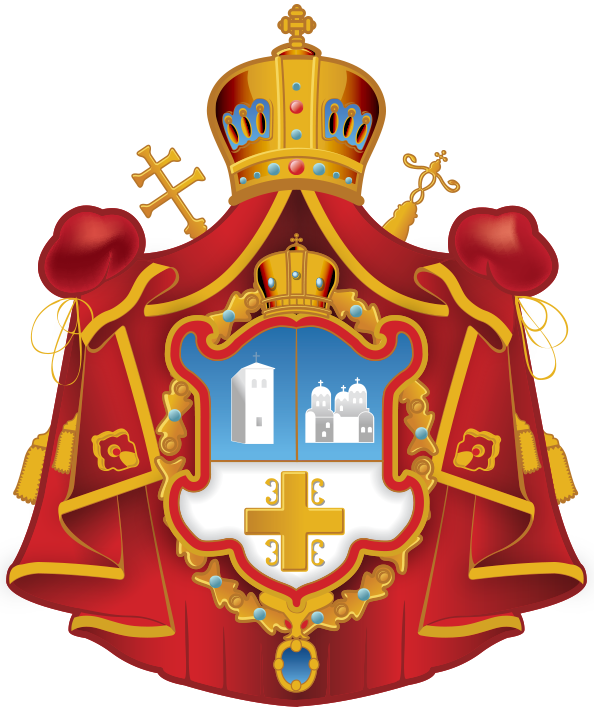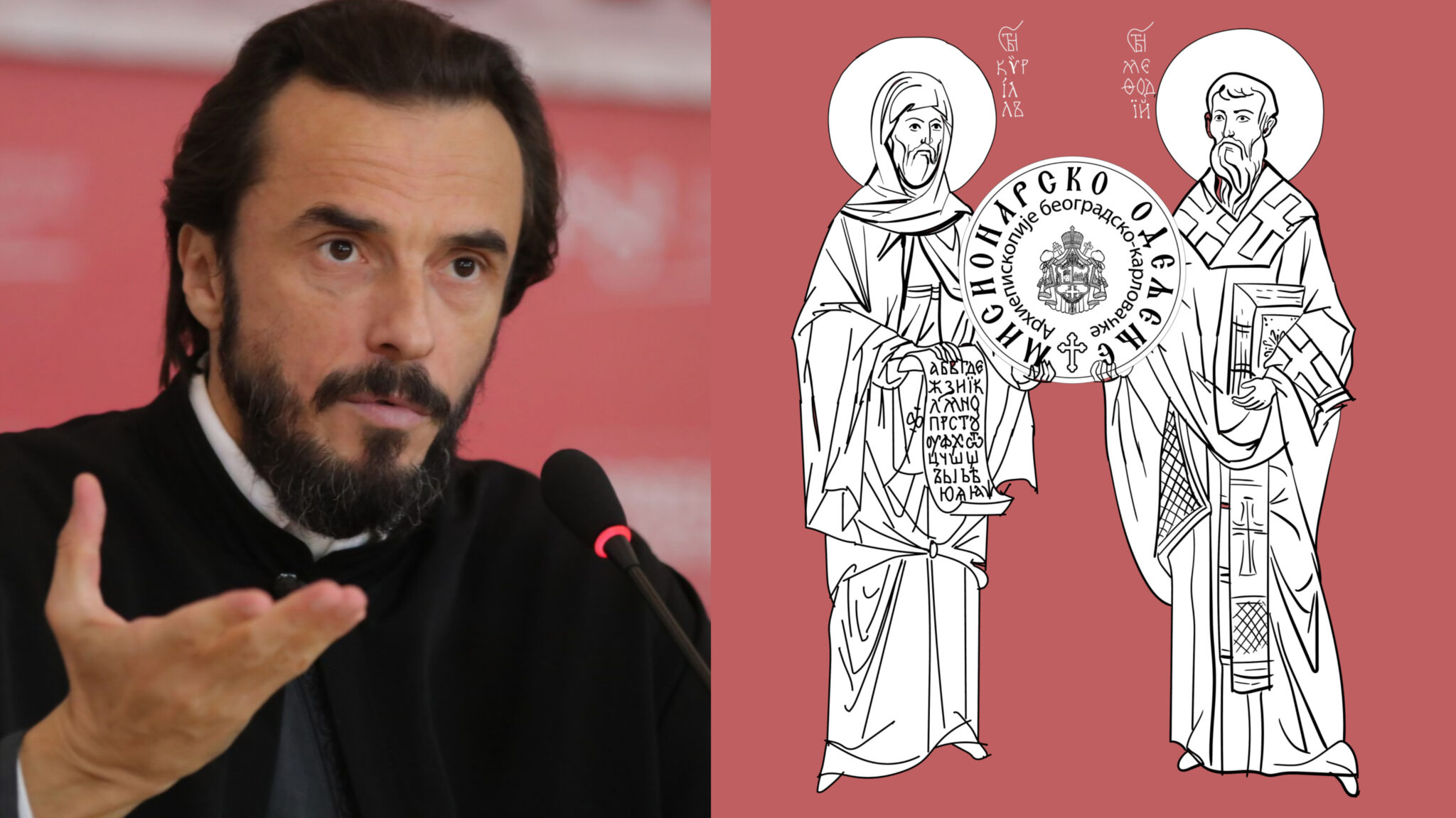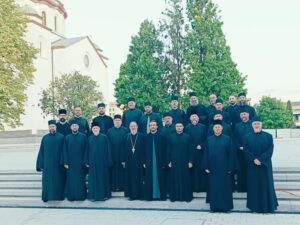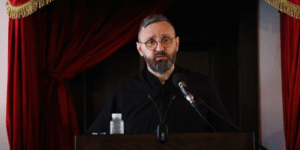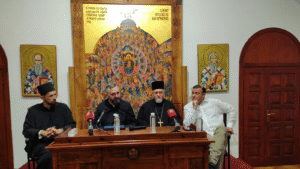This text was published in the Easter issue of the journal The Lord’s Vineyard (2025), pp. 10–14
Rev. Dr Oliver Subotić: The Work of the Missionary Department of the Archdiocese of Belgrade and Karlovci
On the liturgical commemoration day of Saint Cyril Equal-to-the-Apostles, the Enlightener of the Slavs, 14/27 February 2024, the wider public was informed that, by the blessing of His Holiness the Serbian Patriarch Porfirije, the Missionary Department of the Archdiocese of Belgrade and Karlovci had been established. In this issue of The Lord’s Vineyard, we bring you the interview with Rev. Dr Oliver Subotić, parish priest at the Church of St Alexander Nevsky in Belgrade, who is the first appointed director of this missionary body.
• Following a wise decision and a blessing of the primate of our local Church, the Archdiocese of Belgrade and Karlovci, as the central eparchy of the Serbian Orthodox Church, has had a specially created missionary body for the first time in its history, under the direct jurisdiction and supervision of the Serbian Patriarch. Dear Rev. Oliver, could you please begin by sharing with our readers the details concerning the establishment and significance of the Missionary Department of the Archdiocese of Belgrade and Karlovci?
-The idea of launching a distinct organizational unit focused specifically on church mission has been present in our local Church for more than a decade. In this regard, I would remind readers that in 2014 a Missionary Department project within the Holy Synod of Bishops of our Church was initiated, but did not succeed due to procedural difficulties.
Patriarch Porfirije was well aware of this state of affairs. Shortly after his election to the Throne of Saint Sava, he invited me for a conversation on several topics (at the time I was serving as editor of the Serbian Orthodox Church’s Information Service), during which he proposed the establishment of a Missionary Department within the jurisdiction of the Archdiocese of Belgrade and Karlovci. The Patriarch’s idea was simple, yet eminently practical: by starting at the diocesan level, we would circumvent complex procedural issues, and in due course the initiative—once it was fully developed—could become a missionary “blueprint“ that other interested dioceses could adopt, thus acquiring broader significance.
Naturally, I was delighted by our Patriarch’s proposal and immediately began devising a comprehensive plan with His blessing. In the ensuing period, we worked in stages at developing collectively a systematic concept, reporting regularly to the Patriarch and consulting with him or his closest associates. Through our joint efforts, we eventually devised a detailed project plan, which was formalized in a legally appropriate form as a Founding Act issued by His Holiness the Serbian Patriarch Porfirije.
Given that this is the first diocesan missionary body of its kind in our local Church, it already has a historic significamce. As for actual results, we place our trust in the Allmighty God that they will soon become apparent.
• The Department consists of five distinct sections. This would be an appropriate moment to have each of them introduced to our readers, together with the coordinators at their helm.
-The first section within the Missionary Department of the Archdiocese of Belgrade and Karlovci is aimed at parish mission. It is designed as a mentoring programme for young priests with up to three years of priestly service. Through this programme, they receive practical guidance from more experienced clergy in the form of lectures which are closed to the public. Moreover, the section also facilitates one-on-one support for younger clergy, helping them address specific pastoral challenges they face in their parishes and providing them with much-needed spiritual encouragement on a personal level. The coordinator of this section is Protopresbyter-Stavrophor Vajo Jović, one of the most respected priests of the Archdiocese, who possesses extensive experience in both parish and missionary work.
The second is the Section for External Mission, which focuses on missionary work with foreign nationals residing—either permanently or temporarily—in the Serbian capital. Given the increasing number of foreigners visiting Orthodox churches in Belgrade and their interest in Orthodoxy, this missionary effort has become absolutely necessary. At the same time, it represents the first systematically devised project by a Serbian Orthodox diocese in the field of external mission. Due to its strategic significance, this section’s coordinator is also the Director of the Missionary Department as a whole.
The Section for Apologetic Mission, led by the renowned cult and sect expert, and FECRIS member Zoran Luković, has a defensive role. This section monitors the activity of destructive and totalitarian cults, develops appropriate apologetic responses to contemporary challenges, and works to educate clergy in the Archdiocese regarding sectarian activity.
The Section for Dialogue in the Public Sphere focuses on organizing public forums and lectures in Belgrade, addressing various topics and dilemmas from a Christian perspective. It also organizes regular polemical panel discussions, where different issues are debated in a pro et contra format. This helps, indirectly, to dispel enduring stereotypes about the Serbian Orthodox Church in the public domain. This section is aimed primarily at academics and Serbian intellectuals and is coordinated by Rev. Dr Aleksandar Milojkov, a professor of religious education.
Finally, the Section for Electronic Mission, led by IT specialist Nenad Badovinac, focuses on the use of modern information and communication technologies with the aim of advancing missionary activities. This section is intended both to support the work of the other sections and to assist parish churches within the Archdiocese in their outreach efforts in the digital sphere.
•Who are your other associates and collaborators within the Missionary Department, apart from the coordinators you’ve mentioned, and in what ways do they contribute?
-As of the time of writing the responses to the questions in this interview, we have around ten permanent expert collaborators. Within the Section for External Mission, I would particularly like to bring attention to Dr Sandra Knežević, my former colleague from the Faculty of Organizational Sciences. She lived in China for ten years and earned her doctorate there with a dissertation on the Russian spiritual mission in Shanghai. She is our main collaborator in external mission work among Chinese nationals living in Serbia, and it is an activity which we have been increasingly developing in recent months.
Recently, Stanoje Stanković has also joined us as an external expert consultant; he has years of successful collaboration with missionaries around the world behind him.
The Section for Apologetic Mission includes several important permanent collaborators, among whom Professor Dr Jovan Mirić and PhD candidates Slobodan Spasić and Andreja Protić, deserve a special mention. Together with the coordinator Zoran Luković, they are considered to be amongt the most authoritative figures in the study of sectarianism, guruism, and totalitarian and destructive cults.
• The Missionary Department of the Archdiocese of Belgrade and Karlovci has, since its inception, acted with remarkable gravitas and commitment, to which the content available on both the Serbian and English versions of the Department’s official website can attest. What projects have you completed so far, and which are planned for the near future?
At present, the Department’s key projects include regular monthly forums (organized in cooperation with the Belgrade Youth Centre through our Section for Dialogue in the Public Sphere), monthly lectures in English for foreign nationals living in Belgrade (conducted within the NevskyTalks project in cooperation with the Church of St Alexander Nevsky in Dorćol), and the Chinese-Language Mission Programme, a completely new initiative in this region, focused exclusively on Chinese citizens residing in Serbia— of which at present there are tens of thousands.
Last year, we launched a regular cycle of seminars for the clergy of the Archdiocese of Belgrade and Karlovci who wish to be trained for mission in the digital space. We also held a series of lectures for priests on the topic of the new cult movements and phenomena they need to be familiar with, since today’s challenges in this area considerably threaten parish life in the Serbian capital. Furthermore, we are planning to offer intensive foreign language courses tailored to the needs of missionary work for the clergy of the Archdiocese.
Among the upcoming activities, we must not omit to mention your own contribution, dear brother Branislav, as a permanent expert associate of the Section for Electronic Mission. You devised a very important missionary internet project titled “Kinonia,” which, with the blessing of His Holiness, was officially launched on the Feast of the Indiction—the Church New Year—on 1/14 September 2024.
• In addition to serving as the Director of the Department, you are also entrusted with heading the Section for External Mission. How demanding is this position, considering how difficult it can be to reach people most in need of this type of mission? What would you single out from the work of this Section so far?
-Heading this section is simultaneously very challenging and extremely inspiring. I have always wondered how it is that the Serbian Orthodox Church never really had its “time in the sun” in the field of external mission, considering our large expatriate community scattered all over the world. It is a tragic reality, which at the same time provides a great potential for laymen mission— one we are compelled to utilize.
Furthermore, in this day and age we are able to proclaim the Gospel to local populations of other nations without having to go to America, China, India, Turkey, or any other country—because their citizens are already here, in Serbia. They visit our churches in great numbers and show genuine interest in Orthodoxy. Failing to respond to this reality would be a grave sin and a serious act of negligence.
Indeed, the experience of the Moscow Patriarchate reveals that the development of external mission has an immensely positive feedback effect on internal mission.
In this day and age, we have been afforded great opportunities in the field of external mission. As one contemporary Russian missionary put it succintly: “Christ is sending fish into our nets—we only need to pull them to the surface.” What is required, then, is effort and goodwill: we must learn foreign languages, demonstrate perseverance and patience in our work, and above all, have faith and trust in our Lord Jesus Christ, that He will crown our efforts with fruit in abundance. It is God who acts through His uncreated energies—we are merely His co-workers. Therefore, we must not be negligent or inactive in our missionary calling, for we will have to give an account before God for what we did concerning those not yet illumined by the Gospel—those whom the Lord Himself has sent to us.
• Protopresbyter-Stavrophor Vajo Jović, a retired priest with many years of missionary experience, successfully heads the Section focused on young clergy with up to three years of priestly service. What topics have been covered in past mentoring programme sessions, and how do you, as a clergyman, evaluate the significance of this section’s efforts?
-Thus far, Rev. Vajo Jović has delivered lectures on the role of the priest in his parish, in his brotherhood, and in his family, as well as on the Holy Mystery of Baptism and its proper observance. In the future, we plan to involve other experienced elder priests so that they, too, may share their valuable insights with their younger brethren.
Systematic work with young clergy is vitally important. It has become clear that these younger priests are very receptive to adopting sound practices from their senior counterparts, and that this section provides them with significant support on many levels. Nearly all the young priests of the Archdiocese—more than twenty in total—who attend these specially organized interactive lectures express deep appreciation for the attention given to them. In addition, each session is typically attended by at least one senior priest who joins voluntarily, contributing to the discussion and exchanging views with the younger clergy in a warm and fraternal atmosphere. On one occasion, we were even visited by a young priest from the Diocese of Valjevo, with the blessing of his bishop, who came specifically to observe the format of our seminars first-hand.
• Is there a plan for the Missionary Department of the Archdiocese of Belgrade and Karlovci to initiate a publishing effort, producing publications such as books and journals with a missionary focus?
-Indeed, such an initiative is planned. However, for the time being, due to practical constraints, we are limited to smaller brochures and leaflets. For example, in the month of June, on the feast day of St John of Shanghai, we published a well-designed, full-colour leaflet containing the prayers Heavenly King, Our Father, Theotokos and Virgin, Prayer to the Guardian Angel, and the Nicene Creed running parallel in Serbian and Chinese.
We also printed an illustrated colour booklet with a condensed hagiography of St John of Shanghai in a bilingual Serbian-Chinese format. Any priest of the Serbian Orthodox Church who wishes to distribute these materials can contact us, and we will provide them in a digital format for use in their local missionary efforts.
• The Missionary Department of the Archdiocese of Belgrade and Karlovci celebrated its first patronal feast on the day of Saints Cyril and Methodius, 11/24 May 2024. This gathering was particularly enhanced by the presence of His Holiness the Serbian Patriarch Porfirije. Would you share with our readers some impressions from this prayerful celebration?
To mark the celebration of the Department’s patronal feast, the festal offerings were blessed by the Serbian Patriarch Porfirije, who came in person to encourage us and show his support. On that day, the Patriarch spent a significant amount of time speaking with the members of the Department and with foreign participants of missionary seminars. We were deeply moved by the attention he gave us, especially by our rich and lively exchanges on different missionary topics. Patriarch Porfirije continues to offer us his unwavering support— in words and deeds.
I pointed out in my address that day that the name of Patriarch Porfirije has forever been inscribed in gold in the missionary annals of the Archdiocese of Belgrade and Karlovci, for he was the one who founded the Missionary Department and provided all the necessary prerequisites that enable its functioning . I continue to stand firmly behind those words to this day. The rest is up to us—the members of the Missionary Department—to justify the trust and support that the Patriarch has placed in us.
• For nearly two decades, you served as the editor-in-chief of The Orthodox Missionary, the official missionary periodical of the Serbian Orthodox Church for the youth. This magazine counts among the most cherished religious publications of its kind, through which many generations have been helped to acquaint themselves with the mystery of our faith. Father, how much did The Orthodox Missionary help you personally in your spiritual life, and could we say that your long experience as its editor prepared you for the responsible and important position which you occupy today?
-That magazine, which I oversaw for sixteen consecutive years by the decision of the Holy Synod of Bishops, enabled me to acquire new missionary experiences and connected me with many missionaries that I collaborate with to this day.
Secondly, being an editor gradually helped me to refine my own writing style and to adopt a more accessible vocabulary—one better suited to the needs of missionary outreach.
Thirdly, I gained valuable knowledge and direct experience of the practical side of things, related to the organization of all the different stages involved in publishing.
Finally, the years spent editing The Orthodox Missionary in many ways prepared me for the new responsibilities entrusted to me by Patriarch Porfirije in heading the Missionary Department of the Archdiocese of Belgrade and Karlovci.
Considering all this, there is no doubt that the years as editor-in-chief of The Orthodox Missionary has had an enormous importance for me.
• Honourable Father Oliver, may I ask you, in closing, to offer a word of spiritual counsel to the readers of The Lord’s Vineyard?
I thank you for the honour of interviewing me for The Lord’s Vineyard for the second time. I extend my greetings to your readers and call upon them to take active participation in the missionary activities of our Church-depending on their means, knowledge, and talents, of course.
Interview conducted by: Catechist Branislav Ilić
